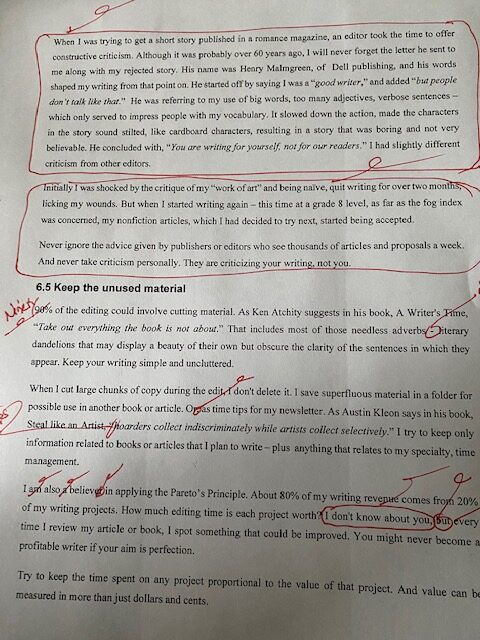Michelangelo was a subtractive sculptor. He used a mallet and chisels and other tools to free a figure he visualized in a block of marble. It is the oldest form of sculpture, and many artists can visualize the finished piece of art in that block of granite or wood, or soap or whatever medium they are using, and free it by chipping away any unwanted parts. They must be careful not to chip away too much, however, or they have ruined the figure they just released.
At the Academy Awards, in about two-thirds of the cases, the movie nominated for “Best Film Editing” has gone on to win “Best Picture” And, the editing of a book manuscript can make the difference between a publishing contract and a rejection slip.
This can apply to editing your writing as well. For example, there could be a best-selling book in your finished manuscript, but you must chip away anything that only serves to obscure the main purpose of that book.
Editing usually refers to preparing written material for publication by correcting, condensing, or otherwise modifying it. For example, in Stephen King’s non-fiction book, On Writing, he describes his experience as a teenager when submitting a report on a basketball game. His piece was completely transformed by an editor. The editor did it by deleting unnecessary words. After the edit, he told King, “When you write a story, you are telling yourself the story. When you rewrite, your main job is taking out all the things that are not the story.”
Similarly, when you are working on your job, you should eliminate everything that is not the job. This might include unnecessary tasks and activities, as well as interruptions and distractions. Most people can increase their personal productivity and relieve stress in the process simply by editing out any work that does not help achieve their goals.
As Gary Keller said in his book, The One Thing, “Don’t focus on being busy; focus on being productive.” To do this, you must focus on those tasks and activities that contribute most to the achievement of your goals. Busy work, distractions, interruptions, and so on must be edited out of your day.
The similarity between editing a piece of writing and editing a piece of your day ends here. It takes more than a stroke of a pen to delete interruptions for instance. But with self-discipline, and a set of personal policies that include when and how often you will check your email, silence your smartphone, visit social media, and so on, you can edit out a lot of non-productive time.
If you run a business, you can also edit out unprofitable products as well as unnecessary activities that consume valuable time. For example, I used to write a weekly blog article for my website and post it on social media. Recently, I reduced this activity to every second week or so. I am sure it will have little or no impact on my business. But it will help relieve the stress of my self-imposed deadlines, and free up time for more important activities, such as my paid writing projects.
Whether you want to become a prolific writer, a more profitable business, or a more peaceful person, you must visualize the kind of day you want to have and edit out anything you see that is not part of that day.
Be a subtractive sculptor.


Recent Comments